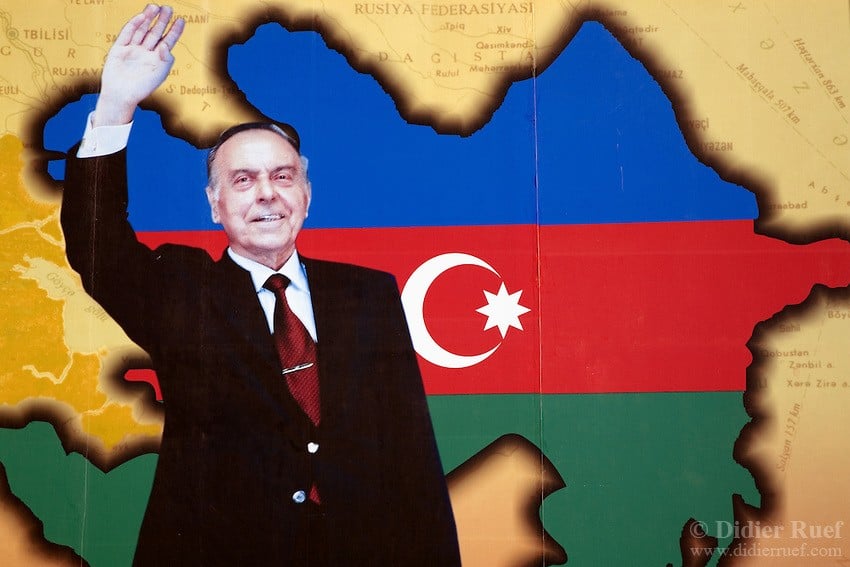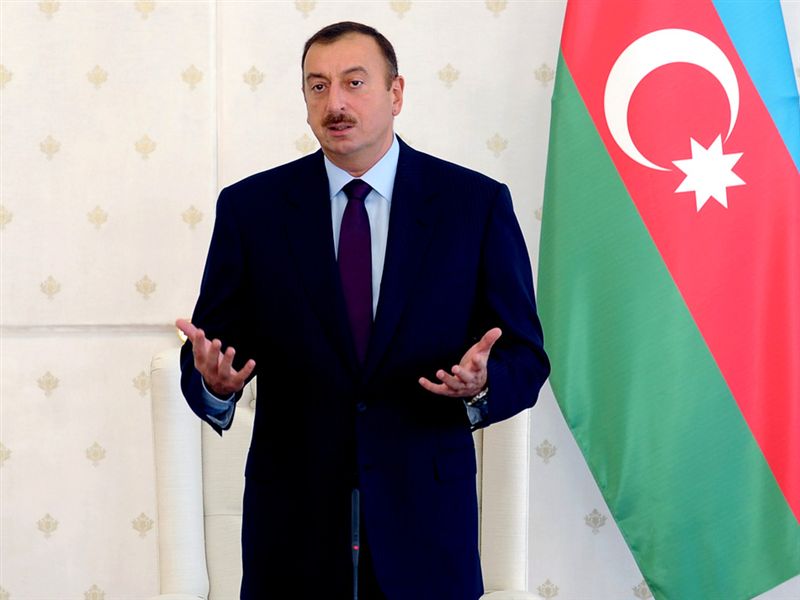Mehmood Ul Hassan Khan
Pakistan and Azerbaijan bilateral relations were established 20 years ago. Now both are strategic partners. The Pak-Azerbaijan friendship was founded by two great leaders of the two countries, Heydar Aliyev and Benazir Bhutto. National Bank of Pakistan was the first foreign bank to be allowed to open a branch in Azerbaijan. Now Pakistan and Azerbaijan relationship completes 20 years of cooperation. Moreover, Pakistan and Azerbaijan are two brotherly Muslim countries with unique commonalities of historical, religious and political nature and after the establishment of the formal diplomatic relations, there was no look back and the ties grew on steady pace.
Silk Route Linkage
Both countries had cultural, social, religious and above all civilizational ties through famous Silk Route in the past. Caravans from both regions used this route extensively for trading purpose. Now, a corner of Azeri culture has been established in Look Versa in Islamabad and Azeri students are studying in Pakistan. Pakistani student are also taking education in Azeri institutions. These bonds will be further strengthened.
Right from the beginning, the governments and the political leaderships of both sides have been keen to further develop and consolidate the bond of friendship. Both shared commonality of opinion on different regional and international issues and had supported each other on challenges faced by them. Pakistan and Azerbaijan need to take effective measures to enhance their bilateral trade ties by increasing communication linkages and elimination of travel restrictions.
Trustworthy Bilateral Relations
Bilateral relations between Pakistan and Azerbaijan are constantly on the move adding trade and economic ties have already been given new dimensions. Exchange of visits of Azerbaijan and Pakistani leaders as well as the other high level delegations played a pivotal role in cementing the links between the countries and people alike. Agreements in political, economic, strategic, social, humanitarian, cultural and other sectors signed during these visits formed a solid legislative base.
Strategic Partnership
Both sides have reiterated to further strengthen existing bilateral ties through enhanced interaction between the parliaments and people. Pakistan was among the first states to recognize Azerbaijan’s independence following the 1991 Soviet collapse. Conversely, Islamabad has not yet formally recognized Armenia, Baku’s arch-rival. Pakistan supports Azerbaijan on the dispute of Armenia and likewise Azerbaijan supports Pakistan on the dispute of Kashmir. Joint Ministerial Session held in December 2011 both sides decided to enhance economic relations at par to the political relations.
Meetings at the highest level
President Farooq Ahmed Khan Lagari visited 1995 in Baku, Azerbaijan. In response to it Late Heydar Aliyev visited to Islamabad in 1996. Afterwards, in 2004, 2005, former president Pervez Musharraf went to Azerbaijan. President Liham Aliyev visited Pakistan. Series of MOUs and agreements in tourism, trade, humanitarian, construction, military and security fields, compacting narcotics and the last but not the least, international terrorism have been inked which need to be speed-up for the further strengthening of bilateral relations.
Economic and Commercial Relations
Both countries are keen to further enhance its bilateral, economic and commercial relations with Pakistan with special focus on improving the deteriorating energy situation in the country. Economic diplomacy is the mantra of both the countries in this regard, effective measures and mechanism have already been initiated to take advantage comparative advantages of each other.
Bilateral Trade Volumes
At present, the political relations between Pakistan and Azerbaijan are at the highest level. The bilateral trade between the two countries is only US$ 22 million in 2012-2013 that is far below their potential. It is hoped that taking effective trade facilitation measures, including easing travel by improving communication and transportation links would be instrumental for further enhancing of trade volumes. Azerbaijan’s oil revenue has helped increase per capita income of nine million people to $ 5000.
(US$ million)
Years Imports Exports Total Balance Pakistan’s Exports
2006 1,459,000 925,000 2,384,00 (-)534,00 Agriculture products, Rice, Fruits & Vegetables, Flour
2007 2,485,200 1,236,000 3,721,200 (-)1,249,200 Pakistan’s Imports
2008 6,317,800 24,800 6,342,600 (-)6,293,000 Cotton, Aluminum, Telecommunication equipment, medical equipment, plastic etc.
2009 5947,800 140,000 6,087,500 (-)5,807,800 Azerbaijan’s Imports
2010 2,543,400 85,500 2,628,900 (-)2,457,900 Medical equipment, fixtures, drugs, packing material, textile and plastic articles
2011 3,014,800 7300 3,022,100 -(-)3,007,500
Source: Foreign Ministry of Azerbaijan (2012)
Now, Azerbaijan would increase its airline fleet by 2014 to establish direct air-link between Islamabad and Baku which would bring people of the two countries closer to each other. It is hoped that Pak-Azerbaijan Business Forum would open new avenues of cooperation.
Construction Sector
The construction sector is one of the fastest growing areas of Azerbaijan’s economy as it is in process of constructing huge buildings and a new island that provide investment opportunity of about $130 billion. The two countries also have a potential of joint ventures in pharmaceutical, agriculture and manufacturing sectors.
Liberal Visa Policy
It is strongly suggested that both the countries must ensure a liberal visa policy to enable the businessmen get visa easily and meet each other, which is imperative to boost trade between the two countries as there is enough potential in various fields between the two countries to increase trade.
The current level of cooperation is beneficial enough for both sides. For Pakistan, the strategic alliance with Azerbaijan offers a degree of recognition of Pakistan’s bid or become a more active, assertive and powerful regional actor. For Azerbaijan, Pakistan is also an important diplomatic supporter and more recently, as key military partner.
Export of Value-Added Agricultural Products
Pakistan can export to Azerbaijan its value-added agricultural products like mangoes, dates, fruits, sports and surgical goods. Pakistan s Basmati rice has a huge demand in Azerbaijan. The establishment of joint businesses between Pakistan and the Republic of Azerbaijan could enhance the trade volume between these two countries 100 times greater than the existing minimum level of trade. All the chambers of commerce in the country are of the view that our energy deficit could be overcome by trading with Azerbaijan. Pakistan could import lubricants, oil and gas, and other petroleum products from Azerbaijan.
The entrepreneurs in Azerbaijan are interested in importing surgical instruments, agricultural and many other products from Pakistan directly rather than importing indirectly via interference of any middle country like United States of America, UAE, etc.
Expected Multidimensional Benefits
Many research studies suggest that the economic relations between Central Asian Republics and SAARC countries would be a win-win situation and bring economic revolution in the region. Azerbaijan taking advantage of geostrategic relations of Pakistan can export their consignments from Gwadar and other ports of Karachi to SAARC, ASEAN and GCC countries.
Military Cooperation
Military cooperation with Azerbaijan is increasing year by year. Officers of Azerbaijan have already participated in different training activities in educational facilities of Pakistan’s armed forces. Similarly, Pakistani officers participate in courses of the Azerbaijan War College. Under the leadership of the National Leader of Azerbaijan, Heydar Aliyev, the Azerbaijan forces halted aggression committed by Armenia soon after independence of the country and regained substantial parts of occupied lands.
The two countries signed a defense agreement in late January and naval officers subsequently held discussions on military-technical issues. In addition, Azerbaijani naval personnel participated in a Pakistani-led exercise, Aman-2013, held in March on the Arabian Sea. Pakistan is also seen as a potential arms supplier to Baku. Over the past few years, for instance, Azerbaijan has shown interest in obtaining JF-17 aircraft, a multi-purpose combat jet developed jointly by Pakistan and China.
Common Points of better understanding
Azerbaijan has strong security ties with Israel. Pakistan does not have diplomatic relations with Israel and clearly feels uncomfortable about Baku’s strategic ties to Tel Aviv. In 2012, Pakistani officials urged Azerbaijani leaders to form a formal military alliance. The better understanding of each other geo-political compulsions and geo-strategic considerations could be game changer in the days to come.
Azerbaijan’s Economics (2013)
According to economic ministry of Azerbaijan (2013), its foreign exchange reserves stood at US$ 45 billion and that the country had invested hugely in other countries. It is because of this stature that recently Azerbaijan has become a non-permanent member of the United Nations Security Council from the competitive East European region.
Remarkable Contribution of Heydar Aliyev
The great journey of modernism and development that has made Azerbaijan stood amongst the greatest nations of the world is correlated to the life and efforts of Heydar Aliyev. His name is also connected with the socio-political, economic and cultural uplift of the people of the country as well. By being an outstanding, farsighted politician and statesmen, he was a living legend and beacon of hope for the people of Azerbaijan.
Pak-Azerbaijan Energy Cooperation
Azerbaijan has expertise in energy sector, having huge hydel power plants as well as expertise in exploration of oil and gas sector; therefore both the countries could cooperate in these areas to further enhance their bilateral relations.
According to its official data (2012-13) it has 19 mega power plants which are the most advanced power system in the South Caucasus region. It has vast range of renewables i.e. solar, wind, hydro and bio-fuels. Its wind generation capacity is 800MM which translates into $US2.2 billion KMH of electricity. Azerbaijan’s solar energy generation is 1500-2000 KMH/M2 as it receives on average 2400-3200 days sunshine in a year. So the prospects of diversification of energy supplies are brighter.
Regional Energy Cooperation and Role of Azerbaijan
Easy and smooth supply of energy has become the need of every country trying to achieve economic growth. Nearly all the governments around the globe and Pakistan is no exception, are trying desperately trying to find new and cheap, if possible, new resources of energy. Our country is facing an energy crisis caused by the lack of energy resources, this sacristy of resources (rise by 10-12 per cent annually) has already caused many multidimensional socio-economic problems in the country and saga still continues.
A consortium of three financial institutions i.e. Islamic Development Bank, Asian Development Bank and World Bank agreed to provide $1 billion to Pakistan, to import electricity from Central Asian Republics (CARs). For this reason ministers of four countries Pakistan, Tajikistan, Kyrgyzstan and Afghanistan signed a resolution to proceed further with the Central Asia/South Asia Regional Electricity Market (Casarem), a project envisaging transmission of 1,300 MW from Tajikistan and Kyrgyzstan to Afghanistan and Pakistan; but further commitment to the project would be linked to the availability of finances.
The Central Asia-South Asia (Casa) 1,000 Project is anticipated to be commissioned by 2013. The project would go a long way in overcoming power shortages in Pakistan (1,000MW) as well as Afghanistan (300 MW).
The project would ensure a supply of estimated 5.5 billion units of electricity per year to Pakistan from Sangtuda, Rogun, Talimardjan and Kambarata hydropower stations at 3.3-4.7 cents per unit. Two routes have been identified for the project; one route will run through Afghanistan’s Kunduz province, Salang Pass and Jalalabad before reaching Peshawar and would cost 4.4 cents per unit. The transmission line through this route would stretch 170km in Tajikistan, 430km in Afghanistan and 50km in Pakistan, this route is also supported by World Bank. Whereas, Pakistan supports a route via Wakhan and Chitral whose length is estimated at 700km and having per unit cost at Peshawar estimated at 4.9 to 5 cents. The line will run 360km in Tajikistan, 30km in Afghanistan (Wakhan) and 310km in Pakistan. It was also decided that Pakistan would bear the cost of all the losses in the transmission system.
The Casa 1000 MW power transmission project comprises developing, designing, procuring, financing, constructing and operating electricity transmission lines and related facilities to enable the trade of electricity among the four countries. It has been decided and finalised that 1300 MW of electricity will be imported from Kyrgyz Republic and Tajikistan of which 300 MW will be for Afghanistan and remaining 1000 MW for Pakistan. According to an official statement the transmission line will be 477-km long, comprising of 500 kV AC line from Kyrgyz Republic to Tajikistan and 750-km of 500 kV high voltage DC between Tajikistan and Pakistan via Kabul. Furthermore, IGC Secretariat will be established at Kabul and hopefully would become operational with immediate effect.
Multiplier effects
(a) The success of this project may decrease the high ratio of the energy shortage in the country as according to government officials, Pakistan faces 3,000MW to 4,000MW electricity shortfall per day.
(b) Pakistan and Afghanistan are going to share the amount to lay transmission lines for electricity imported from CARs.
(c) Pakistan is to invest some $600 million while the remaining amount will be paid by Afghanistan.
(d) Tariff of the imported electricity will stand at 6 cents to 8 cents per kWh as compared to the tariff of Independent Power Producers (IPPs) that is 12 cents to 14 cents/kWh.
(e) It is predicted that the project, if completed and implemented in time, will result in considerably solving the electricity crisis of the country.
(f) The success of the project is extremely important, as it will set a new era of mutual co-operation on electricity.
(g) It will increase trade and economic activities among the participating countries.
(h) It will foster regional electricity market and brings together countries of Central and South Asia and also open new vistas of trade and energy among energy rich and energy deficit countries.
(i) It will enable lower cost (mainly hydroelectric) power to be transmitted from Central Asia to markets in South Asia.
(j) It is estimated that it will increase the exports and lower the cost of production boosting industrial and agricultural productivity in these countries.
World Bank’s assessment
The World Bank has been trying to persuade Pakistan to import 4,000mw of cheap electricity from Central Asian states, besides working on domestic sources to overcome electricity shortage. The bank estimates that Pakistan’s peak demand now exceeds 14,000mw and the present installed capacity of 19,500mw has become inadequate on account of wide variations in water availability. The demand is expected to exceed 20,000mw by 2010. The World Bank says Pakistan should immediately start importing 1,000mw from Tajikistan and the Kyrgyz Republic and then increase imports to 4,000mw in the second phase. According to the World Bank, the cost of supply from Sangtuda, Rogun, Talimardjan and Kambarata power stations will range between 2.26 cents and 3.75 cents per unit compared with the existing average generation cost in Pakistan of 5.6 cents. Another attractive feature of the imports, according to the bank, is that Pakistan’s peak demand occurs in summer when Central Asian power systems have large surplus from their hydroelectric generation stations.
Concluding remarks
Pakistan is an energy deficient country and project like Casarem would be beneficial for it. Strong political commitment, better coordination, suitable geo-strategic scenarios and above all harmony between Pakistan and Azerbaijan would be instrumental to achieve energy independency for stable and sustainable socio-economic growth.
Rapidly developing and flourishing Azerbaijan is a living monument of Mr. Heydar Aliyev. He, with his untiring efforts, indomitable will and dauntless courage united his Nation and built a modern, independent Azerbaijani state. There is an urgent need of better understanding of each other geo-political and geo-strategic compulsions for further strengthening of bilateral relations.
Withdrawal of allied forces/NATO from Afghanistan could open new avenue of opportunities in the region and bilateral relations between the two countries could be game changer in term of energy exports, exploration, food security and above all regional reconciliation.



Dear Sir,
i am interesting in business in Azerbaijan in Import, Export and health and education field.
please help me in this regard.I will be highly obliged.
Muhammad Waseem
CEO
Laycura Consultants (Pakistan)
+92-3224283543
Dear Sir,
i am interesting in business in Azerbaijan in Import, Export and constriction field.
please help me and suggestion, i will be waiting for your kind information.
Muhammad Jamshaid Khan
CEO
Imperial Consultants (Pakistan)
+92-332-1622007
im intrested busines investment in baku city printing press